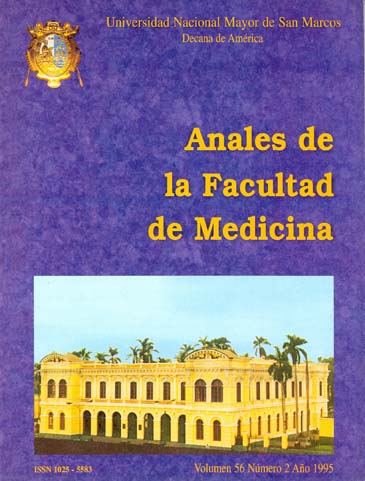Role of magnesium in the efficacy of hypoglycemic agents
DOI:
https://doi.org/10.15381/anales.v56i2.5261Keywords:
magnesium, hypoglycemic agents, calcium, chlorpropamide, glibenclamideAbstract
We wanted to demostrate that magnesium deficiency inhibits basal or exogenous insulin and oral hypoglycemic stimulated glucose utilization. Soleal muscle was removed from twenty-one albine rats (250-300 g) for incubation in Ringer-Krebs media in the presence or absence of magnesium and with a known quantity of glucose (6x10³ mol/L). Samples were studied with spectophotometer before and after incubation with enzymatic glucose. The study involved three stages: in the first, we observed calcium and magnesium interaction; in the second, insulin interaction; and in the third interaction with oral hypoglycemic agents, chlorpropamide and glybenclamide. With basal and exogenous insulin we observed more muscle utilization of glucose in the media that contained calcium and magnesium than in those with calcium but no magnesium. With sulphonilureas interaction there was a decrease of glucose utilization in the medium without magnesium, more with first than second generation sulphonilurea. These results suggest that both tissue utilization of basal glucose and glucose stimulated by hypoglycemic agents depend on magnesium concentration and are decreased with hypomagnesemia.Downloads
Published
1995-12-29
Issue
Section
Trabajos originales
License
Copyright (c) 1995 Fernando Huachin, Ronal Huapaya, Omar Huatuco

This work is licensed under a Creative Commons Attribution-NonCommercial-ShareAlike 4.0 International License.
Those authors who have publications with this magazine accept the following terms:
- Authors will retain their copyrights and guarantee the journal the right of first publication of their work, which will be simultaneously subject to Creative Commons Attribution License that allows third parties to share the work as long as its author and its first publication this magazine are indicated.
- Authors may adopt other non-exclusive licensing agreements for the distribution of the version of the published work (eg, deposit it in an institutional electronic file or publish it in a monographic volume) provided that the initial publication in this magazine is indicated.
- Authors are allowed and recommended to disseminate their work over the Internet (eg: in institutional telematic archives or on their website) before and during the submission process, which It can produce interesting exchanges and increase quotes from the published work. (See El efecto del acceso abierto ).
How to Cite
1.
Huachin F, Huapaya R, Huatuco O. Role of magnesium in the efficacy of hypoglycemic agents. An Fac med [Internet]. 1995 Dec. 29 [cited 2025 May 24];56(2):39-42. Available from: https://revistasinvestigacion.unmsm.edu.pe/index.php/anales/article/view/5261



